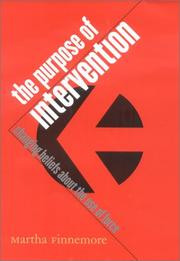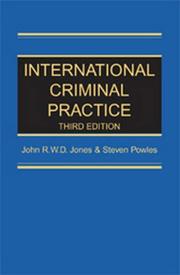| Listing 1 - 10 of 15 | << page >> |
Sort by
|
Digital
Year: 2003 Publisher: Place of publication unknown
Abstract | Keywords | Export | Availability | Bookmark
 Loading...
Loading...Choose an application
- Reference Manager
- EndNote
- RefWorks (Direct export to RefWorks)
Deze publicatie bevat de Nederlandstalige teksten van de verdragen die door België geratificeerd werden van 1948 tot eind 2002, de reserves bij de ratificaties en de stand van ratificatie door andere staten tot december 2002
Law of armed conflicts. Humanitarian law --- Rode Kruis [Vlaanderen] --- Belgium
Book
Year: 2003 Publisher: Namur FUNDP
Abstract | Keywords | Export | Availability | Bookmark
 Loading...
Loading...Choose an application
- Reference Manager
- EndNote
- RefWorks (Direct export to RefWorks)
Book
Year: 2003 Publisher: Antwerpen UA
Abstract | Keywords | Export | Availability | Bookmark
 Loading...
Loading...Choose an application
- Reference Manager
- EndNote
- RefWorks (Direct export to RefWorks)
Law of armed conflicts. Humanitarian law --- International private law --- Europe
Book
Abstract | Keywords | Export | Availability | Bookmark
 Loading...
Loading...Choose an application
- Reference Manager
- EndNote
- RefWorks (Direct export to RefWorks)
National movements --- Law of armed conflicts. Humanitarian law --- Human rights --- Criminal law. Criminal procedure --- Rwanda

ISBN: 0821355031 Year: 2003 Publisher: Washington, D.C. World Bank
Abstract | Keywords | Export | Availability | Bookmark
 Loading...
Loading...Choose an application
- Reference Manager
- EndNote
- RefWorks (Direct export to RefWorks)
Internal politics --- International movements --- National wealth --- Law of armed conflicts. Humanitarian law --- Developing countries
Book
Year: 2003 Publisher: Rabat Remald
Abstract | Keywords | Export | Availability | Bookmark
 Loading...
Loading...Choose an application
- Reference Manager
- EndNote
- RefWorks (Direct export to RefWorks)

ISBN: 1564322912 Year: 2003 Publisher: New York, N.Y. Human Rights Watch
Abstract | Keywords | Export | Availability | Bookmark
 Loading...
Loading...Choose an application
- Reference Manager
- EndNote
- RefWorks (Direct export to RefWorks)
Industrial economics --- Human rights --- Law of armed conflicts. Humanitarian law --- Sudan --- Forced migration --- Petroleum industry and trade

ISBN: 0801438454 0801467071 0801467063 9780801467073 0801489598 9780801489594 9780801438455 0801489598 9780801489594 9780801467066 1322503524 Year: 2003 Publisher: Ithaca (N.Y.) : Cornell university press,
Abstract | Keywords | Export | Availability | Bookmark
 Loading...
Loading...Choose an application
- Reference Manager
- EndNote
- RefWorks (Direct export to RefWorks)
Violence or the potential for violence is a fact of human existence. Many societies, including our own, reward martial success or skill at arms. The ways in which members of a particular society use force reveal a great deal about the nature of authority within the group and about its members' priorities.In The Purpose of Intervention, Martha Finnemore uses one type of force, military intervention, as a window onto the shifting character of international society. She examines the changes, over the past 400 years, about why countries intervene militarily, as well as in the ways they have intervened. It is not the fact of intervention that has altered, she says, but rather the reasons for and meaning behind intervention-the conventional understanding of the purposes for which states can and should use force.Finnemore looks at three types of intervention: collecting debts, addressing humanitarian crises, and acting against states perceived as threats to international peace. In all three, she finds that what is now considered "obvious" was vigorously contested or even rejected by people in earlier periods for well-articulated and logical reasons. A broad historical perspective allows her to explicate long-term trends: the steady erosion of force's normative value in international politics, the growing influence of equality norms in many aspects of global political life, and the increasing importance of law in intervention practices.
Humanitarian intervention. --- Intervention (International law) --- Military policy --- Decision making. --- Intervention (International law). --- Military intervention --- Diplomacy --- International law --- Neutrality --- Law of armed conflicts. Humanitarian law --- Polemology

ISBN: 1571052291 Year: 2003 Publisher: Ardsley, N.Y. Transnational
Abstract | Keywords | Export | Availability | Bookmark
 Loading...
Loading...Choose an application
- Reference Manager
- EndNote
- RefWorks (Direct export to RefWorks)
Book
ISBN: 2960037928 Year: 2003 Publisher: Huy Pangolin
Abstract | Keywords | Export | Availability | Bookmark
 Loading...
Loading...Choose an application
- Reference Manager
- EndNote
- RefWorks (Direct export to RefWorks)
| Listing 1 - 10 of 15 | << page >> |
Sort by
|

 Search
Search Feedback
Feedback About UniCat
About UniCat  Help
Help News
News